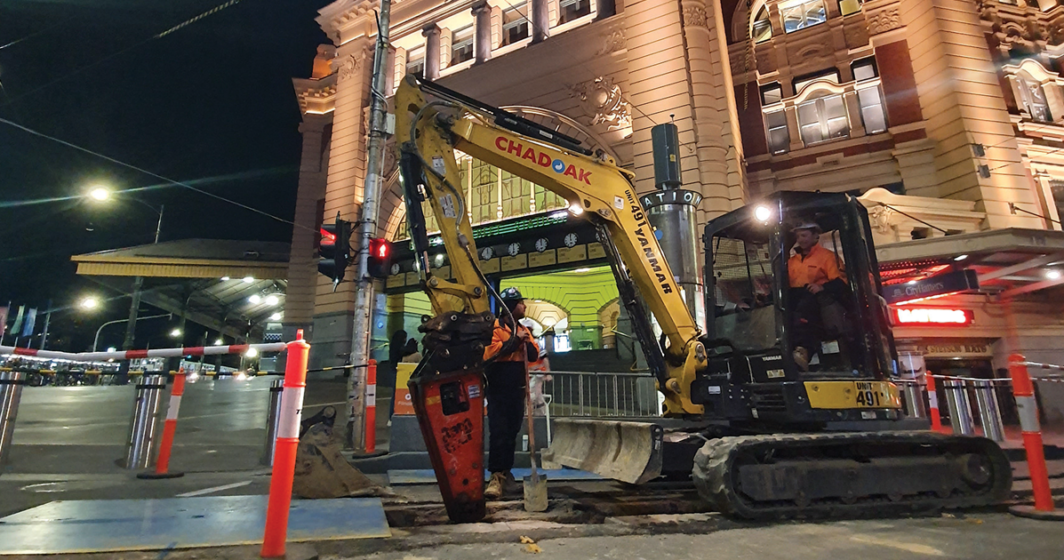It is vital governments across the nation ensure the pipeline of construction and the investment in residential housing is strong to enable the COVID-19 recovery. Kathryn Kernohan reports.
The sudden and devastating impact of the COVID-19 pandemic impacted all facets of our lives - and work - in early 2020.
Overnight, entire industries such as retail and hospitality were forced to shut down or pivot their services to stay viable.

These changes were also deeply felt by the construction industry, Australia’s third largest industry (behind mining and finance) which produces $360 billion in revenue each year. The plumbing industry, which IBISWorld estimates will generate an annual $17.3 billion over coming years, plays a critical role in the sector.
Although essential work and repairs continued in a COVID-safe way, many other projects slowed or stopped. And while the full economic toll of the pandemic remains to be seen, the Lowy Institute estimates that Australia’s post-pandemic output loss, compared to prior outlooks, will exceed $160 billion.
So what role can the plumbing industry, as part of the broader construction industry, play in Australia’s economic recovery from COVID-19?
“We (Australia) will be building ourselves out of this pandemic for many years to come,” Master Plumbers’ and Mechanical Services Association of Australia CEO Peter Daly asserts.
“Both State and Federal Governments have committed large budgets to infrastructure projects that will provide much needed jobs to help us navigate the initial stages of our recovery. Although COVID has wreaked havoc for the majority of 2020, it has also forced our hand to consider fast-tracking many things that may otherwise be slated for years down the track.
“I think it’s a golden opportunity to invest heavily in the country’s future by implementing sustainable building solutions and renewable energy options that the plumbing industry is able to deliver.”
Master Plumbers’ Association of Queensland’s Executive Director Penny Cornah concurs.
“Construction is key to navigating Australia out of the pandemic while maintaining jobs and economic growth,” she says.
“The COVID-19 pandemic has brought about a worldwide recession, which is shaping a new economic landscape. We need to ensure a pipeline of opportunities is continually coming through to support employers, employees and apprentices.”
Infrastructure Australia CEO Romilly Madew agrees.
“Maintaining a pipeline of nationally-significant infrastructure investments is a critical priority for Australia’s economic recovery and for managing the wider impacts of COVID-19. In our survey of industry leaders before the 2020-21 Federal Budget, two-thirds of respondents indicated that the pace of governmentfunded infrastructure projects coming to market was too slow,” she says.
“With a new wave of investment in the infrastructure sector set to drive the nation’s economic recovery, including a major focus on smaller, local and regional projects, the plumbing industry stands to play a strong role in supporting the recovery of communities all around the country.”
The importance of the construction industry driving economic recovery and job growth has been highlighted by Prime Minister Scott Morrison, who in June announced the $688 million HomeBuilder scheme to offer cash grants of up to $25,000 to people building or renovating homes.
“Our JobMaker program is backing a tradie-led recovery to help spark the economy as Australia emerges from the effects of COVID-19,” said the Prime Minister at the time.
“This investment isn’t just about helping Australians bring their dream home to life, it’s about creating jobs and helping support the more than one million workers in the sector including builders, painters, plumbers and electricians across the country.”
It is estimated the scheme will help to support the 140,000 direct jobs and another 1,000,000 related jobs in the residential construction sector.
Other state Governments have announced their own initiatives, such as Victoria fast-tracking priority projects, the South Australian Government offering incentives for new home builders and Western Australia expediting $140 million of transport, road and maritime projects.
Infrastructure Australia has also published its Infrastructure Priority List, which includes 28 projects ready for investment and 131 proposals that it recommends should be developed further to address an identified infrastructure gap. With a total of 155 proposals listed, the Priority List outlines a nationally significant investment pipeline worth $64 billion.
Melbourne-based plumbing firm Cooke & Dowsett works on major projects across Australia and New Zealand. Its current projects include the redevelopment of Melbourne’s State Netball and Hockey Centre, the redevelopment of Lavington Sportsground near Albury and The Hobart Clinic treatment centre.
“The pandemic has impacted our ability to maintain our workforce, effectively resource projects and maintain productivity. For the first time in 30 years we have had to let some of our long-serving talent go to ensure that our future is secured,” General Manager Matthew Quick says.
Another significant challenge experienced by many businesses throughout 2020 has been the differing restrictions enforced by each State Government.
“[This means] we’ve had to manage our workforce on a week-by-week basis, relying on our builders to communicate resourcing restrictions and project delivery expectations in line with individual workplace COVID-19 Safety Plans, frequently changing with just a few days’ notice.”
Penny Cornah says a survey of Master Plumbers Association of Queensland members, published in June, found that key challenges identified throughout the pandemic included a lack of appropriate personal protective equipment (PPE), cash flow and not enough work.
Almost 50 per cent of respondents had successfully enrolled in the Federal Government’s JobKeeper scheme.
However, as can be the case in a crisis, some silver linings have emerged through the adversity.
For Cooke & Dowsett, it’s becoming more agile in working habits.
“We’re adopting and training technology like never before and while we’ve always promoted a work/life balance that is now taking on new meaning. A number of our support staff are working from home and where we once picked up the phone, we’ve become adept at video technology and working in the cloud, ” says Matthew Quick.
The business has also been using contact tracing app 1Breadcrumb on project sites and in its state offices, which allows it to conduct business within Government regulations but also broaden communication and promote its strong safety culture.
Lorena Kollar, HR Officer at Melbourne-based Chadoak, says the company is working hard “to keep the business strong, to continue to win jobs.”
Chadoak works with the Victorian Government’s major Metro Tunnel project, meaning it hasn’t been impacted as much as some other businesses.
“We will come together as a company to comply with the new ‘COVID norm’ when it arrives. As for the future, I don’t think it will ever be the same again but we will get through it together,” she says. (Learn more about Lorena in her profile on page 32).
MPAQ’s Penny Cornah is adamant of plumbing’s place in the post- COVID world.
“Plumbers play a vital role in maintaining and protecting the health and safety of the community through the provision of clean drinking water and the appropriate management of waste. The plumbing industry makes an extraordinary contribution to human health, the environment and prosperity; however, it is minimally recognised,” she says.
“We are a resilient industry and we will overcome the challenges thrown our way.”
Where to from here
Infrastructure Australia has outlined a staged recovery response to COVID-19, involving the following steps:
- Protect the current pipeline of projects
- Mobilise new projects while the COVID-19 risk is managed
- Accelerate efforts that mobilise projects, boost productivity and increase labour participation
- Reform to address industry capacity and accelerate infrastructure delivery
Share this Article






